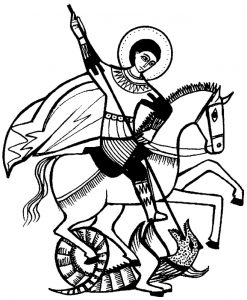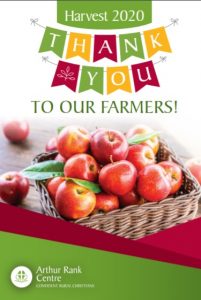Link to the Video for this reflection: https://youtu.be/NMfYjCxdKVA
Revelation 12:7-12, John 1:47-end
In the name of the Father and the Son and the Holy Spirit, Amen
If I were to ask what an angel looks like? We would probably say something like they have :
-
Long flowing white robes
-
Halos – preferably of a tinsel like substance
-
And have in our minds the cast of the last nativity play we saw with lots of small children suitably attired.
-
We could also talk about wings – different ones having different numbers
-
We might say their are different types – seraphs, seraphim and cherubim,
One of our churches locally is dedicated to an angel – St Michael and in my ministry this is my second church dedicated to this particular angel. Angel based dedications of churches often mean that they have their roots along way back in history (about 800 years for our St Michael). In the previous St Michael, where I was the curate (in Basingstoke), I often used to get visiting school children to count the numbers of angels (there were loads). Or even to count the number of wings if I was feeling particularly mischievous!!!
 We need to be a bit careful about describing angels in the way I just have, akin to small children in nativity plays etc…. Because firstly there must be something quite intimidating about encountering angels as almost always the first thing they say to people is ‘Do not be afraid’. And, secondly, our angel Michael, who we mark today is a long way from the fluffy tinsel halo’d sort of angel from our Christmas cards. He is a ‘Fighting’ angel and a warrior angel. His name means ‘Who is like God’ and that has to make us think too.
We need to be a bit careful about describing angels in the way I just have, akin to small children in nativity plays etc…. Because firstly there must be something quite intimidating about encountering angels as almost always the first thing they say to people is ‘Do not be afraid’. And, secondly, our angel Michael, who we mark today is a long way from the fluffy tinsel halo’d sort of angel from our Christmas cards. He is a ‘Fighting’ angel and a warrior angel. His name means ‘Who is like God’ and that has to make us think too.
Biblically: We don’t know a whole lot about Michael. He is one of three angels actually named in the bible. (The other two being Gabriel who is closely associated with the birth of Jesus and whose name means the strength of God, and Raphael who is associated with healing and whose name means the healing of God). Michael is clearly described in two places in the Bible in a vision in the book of Daniel as a prince, and as the head soldier angel – who successfully fought a dragon and defeated the devil in the visions within the Revelation of John. That was our first reading today.
The word angel is taken from a very ordinary word meaning messengers, and angels are a particular type of messenger, as they bring news from God to the people. As such angels are God’s special messengers and we will remember them fulfilling all sorts of roles. There are others of the more aggressive sort alongside Michael: –
-
The cherubim and the flaming sword protecting the garden of Eden (Genesis 3.24)
-
The angel who wrestled all night with Jacob (Genesis 32)
-
The angel who speaks to Joshua (Joshua 5.14)
-
The horses and chariots of fire surrounding Elisha (2 Kings 6.15-19)
-
The fourth man in the fiery furnace (Daniel 3:25)
Now I think that this point about being God’s messengers is a way in which we can be more like angels today – even these tougher sort of angels. It is important for all of us to share our love for God and Jesus. It is no coincidence that the word angel is found within the word ‘evangelise’ which means to talk about Jesus and his story to others, and helping them to develop a faith in God of their own. If we develop this a little further – It also means living lives that share the good news of Jesus too with others
In our current strange times and circumstances where we have found being a person of faith helpful, I think it is important to share that. Where we have found praying has helped us, say so. Where we have found knowing the promise of life everlasting helpful, say so. Where we have found hope in God and comfort through his Spirit helpful, say so.
There are 3 other ways specifically related to harvest and being harvest angels to others I would like to explore now
First – being a harvest angel means sharing our sense of thanksgiving for the harvest. This is particularly important this year, when we cannot do some of the things that would enrich our community, which naturally make this point. Things like bedecking the church with flowers and produce, sharing in harvest lunch and then having lots of fun auctioning all that has been donated.
Thankfulness for the harvest includes thankfulness for
-
The sun and rain,
-
The fields and pastures,
-
The seeds, the hay and feed crops, vegetables, and fruit
-
And all manner of foods we enjoy.
-
For those who grow it, who farm it, who harvest, process and retail our food.
-
All the myriad of skills that sustain our meal
Sharing our thankfulness with others helps us all to keep a right balance in things, not getting too puffed up with our own self-importance, but recognising all that goes into making our daily bread.
The second way we can be harvest angels is in how we choose to live our lives. We will remember from the account of creation in Genesis, that on the sixth day of creation humankind were given dominion over God’s beautiful world. Humankind is to honour it, and share its’ resources and to live in reverence for creation and in harmony with one another. It is important that we live lightly on our earth, that we honour it, live in reverence to it and share the resources we have harmoniously, by looking at and modifying our lifestyle. There are a selection of ways we can choose to live lightly and to encourage others to live lightly too. This is one of those areas in life – where saying it is not as effective as doing it.
 A third way we can be harvest angels is to regularly pray for our natural world, praying for our local farmers, processors, and retailers and praying for things that are important to them. The Arthur Rank Centre are running a thank you for our farmers campaign for harvest 2020. In our email round robin this week was a poster so you might want to stick that somewhere prominent to show your thanks. They also recommended praying for our farming communities across ‘the triple threat’ that has affected them this year: –
A third way we can be harvest angels is to regularly pray for our natural world, praying for our local farmers, processors, and retailers and praying for things that are important to them. The Arthur Rank Centre are running a thank you for our farmers campaign for harvest 2020. In our email round robin this week was a poster so you might want to stick that somewhere prominent to show your thanks. They also recommended praying for our farming communities across ‘the triple threat’ that has affected them this year: –
-
The vagaries of our weather – and the dry spring which has resulted in a very poor wheat harvest
-
The uncertainties around agricultural policy as we exit the EU etc…
-
The impacts of COVID-19 – particularly on sources of diversified income and work force issues
Whilst we are praying – we might also like to pray for areas across the world where harvests have failed or been poor due to the impact of climate changes or difficult weather too. According to the world bank –
Agricultural developments is one of the most powerful tools to end extreme poverty, boost shared prosperity and feed a projected 9.7 billion people by 2050. And yet agriculture-driven growth, poverty reduction, and food security are at risk: Climate change is already impacting crop yields, especially in the world’s most food-insecure regions. In 2020, shocks related to climate change, conflict, pests and emerging infectious diseases are hurting food production, disrupting supply chains and stressing people’s ability to access nutritious and affordable food.
 So returning to angels where I started – When I was first ordained back in 2004, I was given a card with this picture on it. It says congratulations on your ordination – and then shows the picture of an angel. I was at least initially left with the impression that one of my friends thought I was going to become an angel. At the very least I seem destined to sprout a lacy and sparkly outfit like this angel, a halo and wings. I am glad to say that being ordained has yet to have this effect on me – as having wings could make putting on my clothes very difficult.
So returning to angels where I started – When I was first ordained back in 2004, I was given a card with this picture on it. It says congratulations on your ordination – and then shows the picture of an angel. I was at least initially left with the impression that one of my friends thought I was going to become an angel. At the very least I seem destined to sprout a lacy and sparkly outfit like this angel, a halo and wings. I am glad to say that being ordained has yet to have this effect on me – as having wings could make putting on my clothes very difficult.
Now physically becoming an angel is impossible in this mortal life – as angels are not the same as humans – they are a mixture of spirit and matter and are a different order altogether than human beings. So if we can’t become angels – What we can do is develop angel like qualities by being God’s messengers, and I hope that is what the person that gave me this card really envisaged.
To be God’s messengers we need to share the good news of Jesus and also to be harvest angels share our passion for our created world in all aspects of harvest-time
-
Our sense of thankfulness for the harvest.
-
Our lifestyle choices that mean we live lightly on God’s beautiful world.
-
Our prayers for our local farmers, our agricultural economy and for food production across the world.
Amen
A Harvest Thanksgiving
Let us give thanks to God, the God of all peoples of the earth.
For the colour and forms of your creation and our place within it, we bring our thanks, good Lord: All: your mercy endures for ever.
For our daily food, and for those whose work and skill bring your good gifts to us, we bring our thanks, good Lord: All: your mercy endures for ever.
For the gifts and graces inspired in human minds and hearts; for insight and imagination, for the skills of research which bring healing and fulfilment to the lives of many; we bring our thanks, good Lord: All: your mercy endures for ever.
For the light and shades of the changing seasons, and their variety and dependability; for new life and growth out of barrenness and decay; we bring our thanks, good Lord: All: your mercy endures for ever.
For new hope and strength in our communities, especially in your Church and among all you call to serve you, we bring our thanks, good Lord; All: your mercy endures for ever.
For all in whose lives we see goodness, kindness, gentleness, patience and humility, and all the fruit of the Spirit, we bring our thanks, good Lord: All: your mercy endures for ever.
For the life we have been given, and for all those whom you have given us to share it, we bring our thanks, good Lord: All: your mercy endures for ever.
Resources: – New Revised Standard Version Bible: Anglicised Edition, copyright © 1989, 1995
Arthur Rank centre resources – Thank you for our farmers 2020 https://arthurrankcentre.org.uk/resources/harvest-resources-children-young-people/harvest-resources/ and https://www.worldbank.org/en/topic/agriculture/overview
Some material included is copyright: © The Archbishops’ Council 2000-2020
